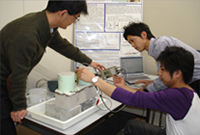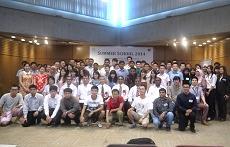-
- We seek to develop engineers and researchers who have strong personality, learning and self-motivation, with analytical, explolatory and problem-solving ability using basic knowledge of engineering, and autonomous adaptability and creativity that can respond flexibility to social change.
- We train people with the ability to analyze and solve the problems of modern society by implementing comprehensive education in the industrial field taking a broad perspective.
- We promote advanced research at the international level, contributing to the creation of an affluent and healthy society.
- We promote technological development through re-education of working people and collaborative research with regional companies for the dynamic development of local communities.
- We revitalize international exchange to build a peaceful international society. The five points above are our aims.
The Graduate School of Advanced Technology and Science was established to allow students to study what they learned as undergraduates with greater specialization. It comprises three colleges and twenty-one courses. Through the master's and doctoral programs, students can engage in advanced research taking a long term perspective, improving their knowledge and skills as researchers.
We are also focusing on training researchers who can play an active role internationally, with an educational program taught only in English and a double degree program in association with partner universities. In addition, we are actively engaged in joint research with businesses to develop personnel with outstanding skills who can play an active role in the international community.
College of Intelligent Structures and Mechanics Systems Engineering

Foundational training
mechanics in the Department
of Mechanical Engineering
The various structures that comprise social infrastructure and transportation machinery are created by construction engineering and mechanical engineering. The design, manufacture, maintenance and repair of these structures is founded on mechanical theory. There is a social demand for the development of advanced intelligent systems combining the latest information systems and environmental systems. Against this background, we aim to foster creative, selfmotivated and individualistic personnel with basic knowledge of mechanical theory who can build intelligent systems.
College of Life and Materials Systems Engineering
Today's problems such as the protection of life and the global environment, food, material circulation of chemicals and other resources, and the protection of biodiversity call for new academic fields that are compatible with the age of globalization, and the development of completely unconventional technologies. In order to meet this situation, we aim to foster personnel with all-round ability in a wide range of engineering fields, with imagination and a humanistic outlook. We combine applied chemical engineering and biotechnology to develop new materials, analyze the function and structure of biomolecules, study resource recycling, develop chemical plants and clarify biological phenomena to develop related technical applications.
College of Systems Innovation Engineering
There is a strong social requirement for personnel who can contribute to the development of today's information society through complex systems combining device component technologies such as physical properties, materials, devices, electronic circuits, information circuits, optical circuits and so on with intelligent software technology. Against this background, we provide a systematic education in basic technologies such as devices, hardware, software, networks and so on with the aim of fostering personnel with the all-round ability required to create systems integrating these technologies.
The CICEE Global Double Degree Program
The Global Double Degree Program (GDDP) is one of the important international educational activities of the Center for International Cooperation in Engineering Education (CICEE). Working closely with the Graduate School of Advanced Technology and Science, the CICEE oversees the GDDP by both accepting and dispatching graduate-level engineering students (both master's and doctoral students) to and from partner universities and their graduate schools. Upon completing the GDDP requirements, students receive two graduate degrees: one degree is awarded by the graduate school of Tokushima University; the second degree is awarded by the partner university's graduate school.
More specifically, the GDDP is a joint educational project organized between Tokushima University and its twelve international partner institutions: Korea Maritime and Ocean University, and Dongeui University in Korea; Harbin Institute of Technology, Tongji University, Beijing University of Posts and Communications, Xi'an Jiaotong University, Dalian Institute of Technology and Nantong University in China; Florida Atlantic University in the USA; INSA Toulouse in France; Southern Taiwan University of Science and Technology ,National Taiwan University of Science and Technology in Taiwan and Universiti Teknikal Malaysia Melaka in Malaysia.
The Global Double Degree Program offers courses from Nanotechnology Engineering, Bio-information Engineering, and Environmental Control Engineering. The goal is to foster an engineer/researcher who is both creative and capable in research; one who can contribute to a problem-solving environment through broad education and using advanced research technology. Our partner universities share a similar aim: to develop internationally qualified graduates.
Other activities of CICEE

Summer School
Every year a Summer School is jointly organized by the CICEE. Nanotechnology and Materials Science, Electrical Engineering and Information are two specialized areas emphasized at the summer school.
To meet the growing demands of a rapidly changing world, the CICEE also offers short term study abroad programs. A short term program typically lasts for 1 week. These program allow graduate students to visit partner universities for short duration; partial financial assistance covers the costs of travel and living expenses.
These programs develop a strong oral and written communication, problem-solving and teamwork skills among students and professors.

